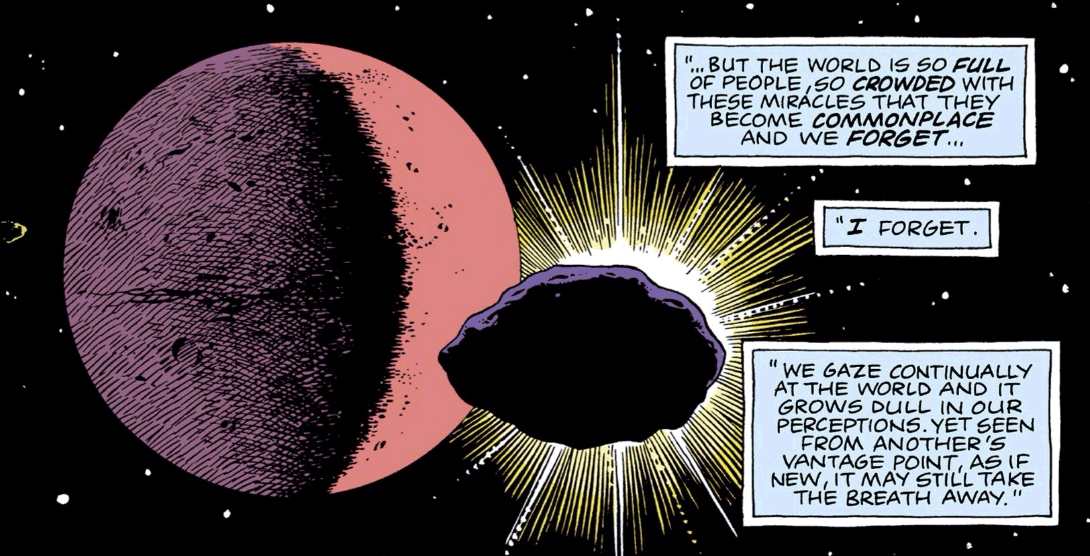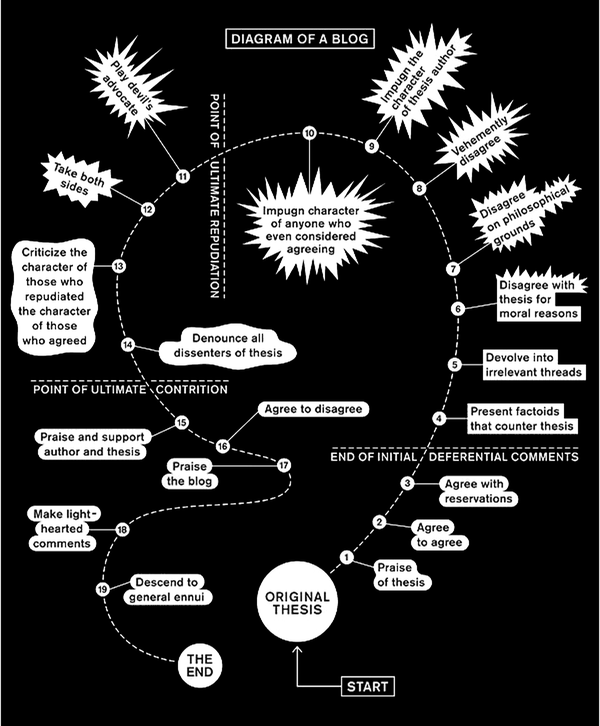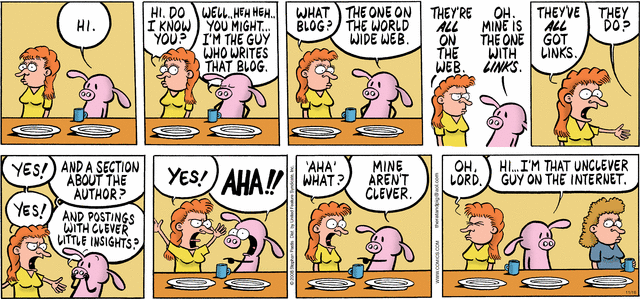Thirteen Blog Clichés
I started out in early 2004 as a blog skeptic. But over the last four years, I’ve become a born-again believer. In that time, I’ve written almost a thousand blog entries, and I’ve read thousands upon thousands of blog entries. As a result, I’ve developed some rather strong opinions about what makes blogs work so well, and what makes blogs sometimes not work so well.
I’d like to share some of the latter with you today, in a piece I call Thirteen Blog Clichés.
Before I start, realize that these are my opinions. That should be a redundant statement on any blog, much less my own, but I’m putting the disclaimer out there anyway. Just because I run my blog a certain way doesn’t make it the right way – or even a very good way. These are preferences, not beliefs. Please don’t be offended if your blog, or a blog you enjoy, violates one of my so-called clichés. I’m not trying to single any one person or blog out here. It’s your blog, and you don’t have to answer to me. I’m just some guy on the internet. Run your blog as you see fit. These are nothing more than broad observations formed over a period of four years where I’ve been deeply immersed in blog culture.
You may not agree that these are clichés. You might even feel very strongly that I’m wrong about all of this. That’s what comments and trackbacks are for. Use them.
1. The Useless Calendar Widget
This list isn’t in any particular order, with one exception. There is nothing I dislike more than the redundant blog calendar widget. It’s like a recurring canker sore we can’t quite seem to rid ourselves of.
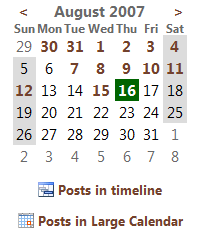
I can’t think of a single time I have ever found the blog calendar widget helpful. My computer already has a calendar function, so it’s not like I need another calendar displayed in my web browser. Every post carries an obvious date stamp, so I can easily discern when it was published. But knowing whether someone posted an entry on the third Tuesday of the month? Utterly useless.
The calendar widget is the vestigial tail of blog engines, evidence of our primordial ancestors. But we’ve evolved; it’s time to lose the tail. Surely there’s something more useful we could put in that space.
2. Random Images Arbitrarily Inserted In Text
One of the cardinal rules of web writing is to avoid large blocks of text. There are plenty of excellent web writing guides that exhort you to break up your text, using bullets, numbered lists, quotes, paragraph breaks, images – anything, anything to avoid creating an intimidating wall of dense, impenetrable text.
And they’re right. That’s what you should do. I do it all the time. I’m doing it right now.
But like all good advice, it can be taken too far. For example, when you find yourself inserting random pictures into your writing for the sole purpose of breaking up the text.
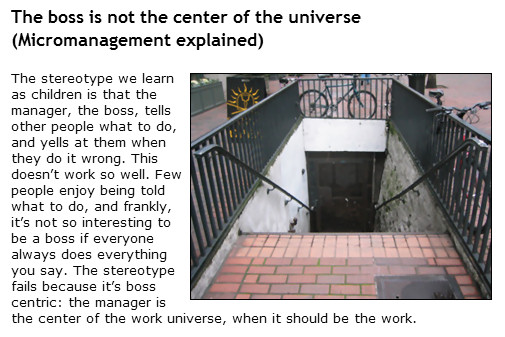
In the above snippet, what does that image have to do with the text? As far as I can tell, absolutely nothing at all. I see this on a disturbing number of blogs and feeds that I regularly read. It’s probably due to the influence of Philip Greenspun and his seminal book, Philip and Alex’s Guide to Web Publishing, where the text is juxtaposed with random photographs that Philip has taken. It’s one of the earliest and best references on web development, and the fact that it’s still relevant today despite its age speaks volumes about the quality of Mr. Greenspun’s writing. But it’s the writing that makes the book a classic, not the amateur photography sprinkled throughout its pages.
As the old adage goes, a picture is worth a thousand words. But you should no more insert a random image into your writing than you would insert a thousand random words into your writing. I don’t care how beautiful your photographs are, it’s a terrible, irresponsible practice that distracts and harms readability.
And those of you sitting there smugly, with your stock photo library and your peripherally, tangentially, almost-but-not-quite related images that you use to break up your text, don’t think I’m not talking about you, either. Because I am. Think about that the next time you read an article about a “web 2.0 bubble” accompanied by – you guessed it – a stock photo of a child blowing a bubble.
Images are not glorified paragraph breaks. Images should contribute to the content and meaning of the article in a substantive way. And if they don’t, they should be cut. Mercilessly.
3. No Information on the Author
When I find well-written articles on blogs that I want to cite, I take great pains to get the author’s name right in my citation. If you’ve written something worth reading on the internet, you’ve joined a rare club indeed, and you deserve proper attribution. It’s the least I can do.
That’s assuming I can find your name.
To be fair, this doesn’t happen often. But it shouldn’t ever happen. The lack of an “About Me” page – or a simple name to attach to the author’s writing – is unforgivable. But it’s still a problem today. Every time a reader encounters a blog with no name in the byline, no background on the author, and no simple way to click through to find out anything about the author, it strains credulity to the breaking point. It devalues not only the author’s writing, but the credibility of blogging in general.
Maintaining a blog of any kind takes quite a bit of effort. It’s irrational to expend that kind of effort without putting your name on it so you can benefit from it. And so we can too. It’s a win-win scenario for you, Mr. Anonymous.
4. Excess Flair
I’d like to talk to you about your flair.
Blogs work because they’re simple. When we clutter up our blogs with a zillion widgets, features, and add-ons, we’re destroying an essential part of what makes blogs worthwhile.

I’ve lost track of all the times I’ve clicked on an image in a blog and been hijacked by some crazy JavaScript image loading technique, when a simple link to the image would have sufficed – and probably would have been faster and more convenient. Or when I’ve moused over an unassuming hyperlink and had an annoying, superfluous image preview of the link pop up when I didn’t want it to. And do your readers really want to see pictures of the last 10 visitors to your blog?
Before you add a new “feature” to your blog, consider whether this feature will be useful enough to your readers to overcome the additional complexity it adds to the page. Hint: almost none of them are.
5. The Giant Blogroll
I’m all for linking generously to outside content. We all stand on the shoulders of giants, after all. Although if you look down in today’s world, you might find that you’re standing on lots and lots of midgets. Large or small, we owe them a debt of gratitude.
Citing your references and influences is a great and necessary thing, but obsessively listing every single blog you read – the so-called “blogroll” – is just noise.

If you’re really reading this many blogs, you should be linking to them organically in your blog posts, in a sort of natural quid pro quo. Wearing a giant blogroll on your sleeve is an empty gesture. I’m reminded of the distasteful way that blogs in giant ad networks (such as Weblogs, Inc.) spam every page with a huge list of internal links to their other blogs. It feels artificial and insincere.
Publish your OPML if you think organic links in your writing aren’t telling the whole story, but avoid cluttering up your page with a huge, spammy blogroll.
6. The Nebulous Tag Cloud
I’m a big fan of tagging. It’s far superior to the old method of placing everything in hierarchical folders. Tag categories on blogs are moderately useful, particularly for bloggers who tend to bounce around among many different topics. What I’ve never found useful, however, is the stereotypical tag cloud visualization, where the size of the tag word varies with its frequency.
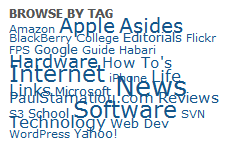
The perception is that tag cloud visualizations are cool, like badges of honor for the tagging club. The reality is that tag cloud visualizations are chaotic, noisy, and unusable. Keep the tagging, lose the cloud. A simple sorted list of tags, along with the number of posts associated with each tag, is much more effective.
7. Excessive Advertisements
Advertising is a fact of life. People need to feed their starving children. I get it. I’ve even reluctantly entered the field myself. But is it really necessary to make your blog look like Times Square? Does every square inch of whitespace have to be filled with paid links, Google AdSense, and ad banners?

In the process of researching this article, I found a related article on blog usability that’s a perfect – even ironic – example of how you can hurt your usability with excessive, obnoxious advertising. It’s everywhere.
It is almost never in the reader’s interest to see advertisements, so my advice is to tread very lightly, and be respectful of your audience. Bad advertising is so prevalent that if you take the time to advertise responsibly, you may find that readers appreciate you for it.
Well, probably not, but it can’t hurt to try.
8. This Ain’t Your Diary
I don’t begrudge anyone their right to post whatever it is they think they need to post on their blog. But let’s be perfectly clear: your readers aren’t coming to your blog to read about you. They’re coming to your blog to find out what it can do for them. If you find your blog turning into a diary of your daily activities, you’ll have a very limited audience unless you happen to be a real world celebrity. Even my wife isn’t particularly interested in the minutiae of what I do every day. Why would I expect my readers to be?

That said, blogs are a place for writers to find an interested audience, and a place for readers to find a helpful peer and a unique voice. It’s OK to be yourself; at some level, it is a cult of personality: people are reading not only because your content is useful to them, but because they like you. It’s normal to inject a regular dose of yourself into the conversation.
But like Tabasco sauce and other powerful seasonings, a little YOU goes a long way. A really long way. Write accordingly.
9. Sorry I Haven’t Written in a While
If you haven’t posted anything new to your blog in a while, don’t waste our time with apologies. Just write! The best apology is new and improved content. Maybe with a wee bit more consistency this time, though.
The most important piece of advice I give anyone who asks me about blogging is this: pick a schedule you can live with, and stick to it. That doesn’t mean you should post substandard crap, of course, but I find that talent is far less important than enthusiasm. And the best way to demonstrate your enthusiasm – and to improve – is to get out there and write. Regularly.
And if you can’t muster the enthusiasm for writing regularly, move on. But don’t stop creating.
10. Blogging About Blogging
I find meta-blogging – blogging about blogging – incredibly boring. I said as much in a recent interview on a site that’s all about blogging (hence the title, Daily Blog Tips). I wasn’t trying to offend or shock; I was just being honest. Sites that contain nothing but tips on how to blog more effectively bore me to tears.
If you accept the premise that most of your readers are not bloggers, then it’s highly likely they won’t be amused, entertained, or informed by a continual stream of blog entries on the art of blogging. Even if they’re filled with extra bloggy goodness.
Meta-blogging is like masturbating. Everyone does it, and there’s nothing wrong with it. But writers who regularly get out a little to explore other topics will be healthier, happier, and ultimately more interesting to be around – regardless of audience.
11. Mindless Link Propagation
One of the most pernicious problems in blogging is the echo chamber effect. Most blog entries merely regurgitate what other people have said or add vapid commentary on top of news articles and press releases. Only the tiniest fraction of blog entries are original content, and only a tiny fraction of that fraction is worth your time. One of my very favorite articles is Chris Pirillo’s piece on 10 Ways to Eliminate the Echo Chamber. Chris has been blogging for a very, very long time and he has the battle scars to prove it. This call to action should be required reading for every blogger. With pop quizzes.
It’s always been deeply disappointing to me that we have the whole of human history to talk about, and most people can’t get past what happened today. If I wanted news, I’d visit one of the hundreds of news sites that do nothing but news every day. Putting yourself in the news business is a thankless, unending grind. Don’t do it.
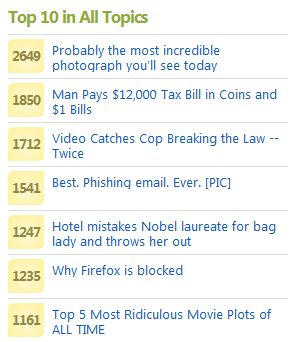
If everyone knows about it, what value does that information have? Three years from now, will anyone care that Apple released a new iPod on that particular day? My advice here is almost contrarian: if everyone else is talking about it, that means you should avoid talking about it. Switch things up. Seek out uncommon sites with unique information. Dig down to original sources and read the material everyone is commenting (comments on top of comments on top of comments) endlessly on.
If all you can find to talk about is what’s already popular, you’re not trying hard enough. Form your own opinion. Do your own research. Go out of your way to blaze a new trail and create something we haven’t already seen hundreds of times before.
12. Top (n) Lists
Yes, exactly like this one.
The problem with Top (n) Lists is that they become a substitute for critical thinking, the classic, laziest possible use of Cliff’s Notes that every college professor and high school teacher fears. You’re supposed to read the book, then read the Cliff’s Notes as a companion to the book – not use the Cliff’s notes as a substitute for reading the book.
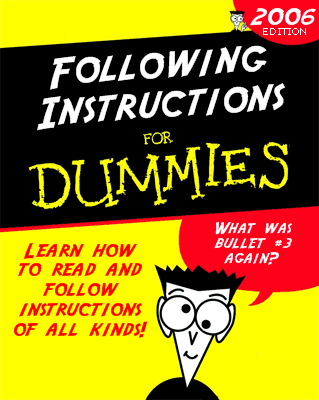
Lists are a great convention. They make sense, people understand them, and they’re a logical way to structure your writing. But don’t let lists become a crutch. I’m always taken aback when I see the “most popular” posts on a blog dominated by Top (n) Lists. Shortcuts are only meaningful if you know what it is, exactly, you’re cutting. If all you read is whatever Top (n) Lists have managed to float to the top of today’s Reddit or Digg homepage, then you’ve cheated yourself out of the deeper experience of reading a complete book.
If you find that the Top (n) List convention is a go-to tool in your writing toolkit, consider rebalancing your writing portfolio with longer, more in-depth pieces as well. Not everything should be a sprint; throw a few small marathons in there somewhere to complement your short distance skills.
13. No Comments Allowed
A blog without comments is not a blog. Yes, there are exceptions for massively popular blogs where comments clearly don’t scale. But until that applies, the value of the two-way conversation far outweighs any minor inconvenience on your part. Writing is inconvenient. Get used to it, and get over yourself. The sum total of community contributions is far more useful than any one thing you’ll ever write.
Besides, It’s an open secret in the blogging community that the comments are often better than the original blog entry itself. Would you browse Amazon without the user reviews? No? Then why would you willingly choose to run your blog that way?
Don’t be afraid of comments. Embrace them. Moderate them. The community will respect you for it, and your blog will be better for it as well.
This piece ended up being much longer than I originally intended. But I’ve had a lot of this stuff on my chest for years, and I wanted to do it justice. I also needed to explain myself in a constructive way so I don’t end up offending too many people.
I’ve already broken at least two of my own rules with this very post. How cliché.
Discuss.


